|
|
|
Sort Order |
|
|
|
Items / Page
|
|
|
|
|
|
|
| Srl | Item |
| 1 |
ID:
121958
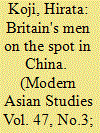

|
|
|
|
|
| Publication |
2013.
|
| Summary/Abstract |
In this paper I examine British policy towards the Yuan Shikai government in China between 1912 and 1914 through a consideration of the role of Britain's 'men on the spot' in China (i.e. British diplomats and bankers resident there). In doing so, I synthesize two bodies of literature that rarely interact: British imperial history and work by China historians. Three main elements shaped British policy in China: first, British policy-makers were determined to support Yuan Shikai's consolidation of power in China; second, in the making of its China policy, the Foreign Office relied heavily on Britain's men on the spot; and, finally, these men were anxious about the vulnerability of the Yuan Shikai government and were therefore manipulated to a certain extent by Chinese politicians. I suggest that British policy-makers were reacting to, rather than controlling, Chinese politics and that in this period collaboration with British imperialism was a rational choice for the Yuan Shikai government.
|
|
|
|
|
|
|
|
|
|
|
|
|
|
|
|
| 2 |
ID:
000760
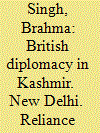

|
|
|
|
|
| Publication |
New Delhi, Reliance Publishing House, 1998.
|
| Description |
xii, 328p.Hbk
|
| Standard Number |
8175100702
|
|
|
|
|
|
|
|
|
|
|
|
Copies: C:1/I:0,R:0,Q:0
Circulation
| Accession# | Call# | Current Location | Status | Policy | Location |
| 041853 | 954.6/SIN 041853 | Main | On Shelf | General | |
|
|
|
|
| 3 |
ID:
127119
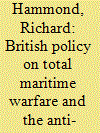

|
|
|
|
|
| Publication |
2013.
|
| Summary/Abstract |
During World War II, the British ran a sustained anti-shipping campaign against Axis merchant and supply traffic in the Mediterranean. Although the effects of this on the land war in North Africa have been the subject of much debate, little attention has been paid to the nature and prosecution of the campaign itself. This article analyses the changes in British attitudes and policy towards attacking merchant shipping prior to and throughout the campaign. It then goes on to examine the conduct of the campaign itself and compare it with other British efforts elsewhere during the war. It concludes that the anti-shipping campaign in the Mediterranean was a unique combined arms offensive for the British, and a major evolution in their attitudes and policy towards maritime total war.
|
|
|
|
|
|
|
|
|
|
|
|
|
|
|
|
| 4 |
ID:
143505


|
|
|
|
|
| Publication |
New Delhi, Vikas Publishing House Pvt Ltd, 1984.
|
| Description |
xii, 363p.hbk
|
| Standard Number |
0706925106
|
|
|
|
|
|
|
|
|
|
|
|
Copies: C:1/I:0,R:0,Q:0
Circulation
| Accession# | Call# | Current Location | Status | Policy | Location |
| 023122 | 954.052/BIP 023122 | Main | On Shelf | General | |
|
|
|
|
| 5 |
ID:
093758
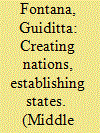

|
|
|
|
|
| Publication |
2010.
|
| Summary/Abstract |
This article explores the creation of modern Iraq in the period between the Armistice of Mudros in October 1918, marking the end of the First World War in the Middle East, and the conclusion of a formal peace treaty with Turkey in 1923. It looks at how far the British occupiers considered the ethno-religious character of the population while defining frontiers and political system in the territory, focusing on the three major ethno-religious groups in Iraq: Shia Arabs, Sunni Arabs and Kurds. It shows that British policy, influenced by the state of Anglo-Turkish relations, the relationship between officials in London and officials in Baghdad, and British economic necessities and public sentiments towards imperialism, evolved through three main phases: progressively, ethnic and religious factors receded in significance.
|
|
|
|
|
|
|
|
|
|
|
|
|
|
|
|
| 6 |
ID:
128225
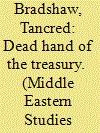

|
|
|
|
|
| Publication |
2014.
|
| Summary/Abstract |
This paper addresses an aspect of British policy in the Trucial States that has received scant scholarly attention. It examines British attempts to promote economic and social development in the Trucial States, and places this policy within the context of British attitudes towards the economic development of the colonial empire. During the 1950s Britain's interest in the Arabian Peninsula expanded, in notable contrast with the rest of the Middle East. One aspect of this expanded role was British efforts to improve the economic and social conditions prior to the discovery of oil in Abu Dhabi in 1958. British officials on the ground were concerned to improve the lot of the population of these impoverished shaikhdoms for a combination of political and strategic and ethical reasons. This article shows that attempts to introduce a modicum of economic and social development in the Trucial States were hindered by the Treasury's refusal to provide adequate funds, and because of inherent problems in finding suitable development projects. Nonetheless, the plans put in place during the 1950s did provide the foundations for subsequent development programmes, which, in turn, drastically expanded as a result of oil wealth.
|
|
|
|
|
|
|
|
|
|
|
|
|
|
|
|
| 7 |
ID:
138443
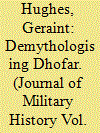

|
|
|
|
|
| Summary/Abstract |
This article re-examines the civil war (1963–1976) between the Sultanate of Oman and the Popular Front for the Liberation of Oman (PFLO), particularly the U.K.’s support of the government. Using archival evidence and private papers, it argues that the counter-insurgency (COIN) campaign’s image as “population-centric” is flawed, and that the British and Omani governments relied more on military measures against the PFLO to recapture Dhofar province than on the “hearts and minds” and civil development programmes emphasised in traditional accounts. It counsels against using Dhofar as a possible example of indirect military assistance in contemporary COIN, arguing that the conflict’s specific historical characteristics may not be replicated now or in the immediate future.
|
|
|
|
|
|
|
|
|
|
|
|
|
|
|
|
| 8 |
ID:
151844


|
|
|
|
|
| Summary/Abstract |
Despite the apparent similarities in Britain's relationship with the Sheikhdoms of the Lower Gulf and the traditional states of southern Arabia, British policy-makers pursued contrasting policies towards the two sets of territories in the era of decolonization. As regards South Arabia, Britain followed a policy of amalgamating the states into a ‘Whitehall’ federation. The fact that the Federation of South Arabia remained dependent on British backing, and in consequence became ineffably associated with British imperialism in an era of anti-colonial Arab nationalism, fatally damaged its chances of longevity. Applying the lessons of failure in South Arabia, the British were far more inconspicuous in the discussions which led to the creation of the United Arab Emirates (UAE). Indeed, the fact that the UAE essentially emerged from the initiative of Sheikhs Zaid of Abu Dhabi and Rashid of Dubai, rather than the British, was one of the key factors in its survival. By contrast, the Federation of South Arabia collapsed ignominiously once the ballast provided by the British had been removed.
|
|
|
|
|
|
|
|
|
|
|
|
|
|
|
|
| 9 |
ID:
143112
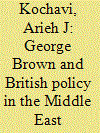

|
|
|
|
|
| Summary/Abstract |
In the aftermath of the 1967 Arab-Israeli War, relations between Britain and the Arab world improved, particularly with Egypt, and also with Jordan. This article shows the driver of this decisive shift in policy was the initiative of Foreign Secretary George Brown. Well aware of the aversion some of his colleagues felt toward Egyptian president Gamal 'Abd al-Nasser and anger over King Husayn of Jordan's defense pact with the Egyptian leader, Brown opted to maneuver behind the government's back and did not hesitate to manipulate and even deceive both the government and Prime Minister Harold Wilson.
|
|
|
|
|
|
|
|
|
|
|
|
|
|
|
|
| 10 |
ID:
132414
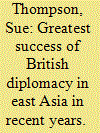

|
|
|
|
|
| Publication |
2014.
|
| Summary/Abstract |
Arthur de la Mare, an under-secretary of state at the British Foreign Office, wrote in 1967 that the ending of the Malaysia-Indonesia Confrontation of 1963-1966 was "the greatest success of British diplomacy in East Asia in recent years." However, historians generally believe British influence in the process to end this conflict was extremely limited, as it has been widely accepted that this conflict ended through bilateral negotiations between Jakarta and Kuala Lumpur. On one level, this view is accurate, but "Confrontation" took months to end and, during this process, British, American, and Malaysian officials hoped to encourage a change in leadership in Jakarta and an eventual end to the conflict. Confrontation was an anti-colonial and a regional dispute greatly affected by the Cold War environment in Southeast Asia and, therefore, not immune from international events or actors, especially the final phase of the conflict
|
|
|
|
|
|
|
|
|
|
|
|
|
|
|
|
| 11 |
ID:
170288
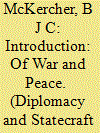

|
|
|
|
|
| Summary/Abstract |
The Treaty of Versailles is one of the twentieth century’s most controversial international agreements; and British policy towards the settlement with defeated Germany equally so. British policy at the Peace Conference stemmed from war aims developed after 1914 – desultory because of unexpected total war. In this process after December 1916, Prime Minister David Lloyd George controlled policy-making and, by late 1918, had general aims involving German territorial losses, disarmament, and paying for the war. Despite distrusting Foreign Office professionals, Lloyd George and his Downing Street advisors at Paris relied on non-professional experts through informal networks below them. One was James Headlam-Morley about the future of Danzig; and several pre-war historians also contributed in a profound way, their experiences stimulating the establishment of diplomatic history as a field of academic research and the emergence of the nascent discipline of international relations. On bigger issues, like Anglo-American naval rivalry that emerged at the Conference, Lloyd George sparred with President Woodrow Wilson. And as only Lloyd George of the Big Four survived politically after the Conference, development of his ideas and policies during the war and after played a major role in post-war international politics. Some issues at Paris have not received needed attention like the restitution of cultural objects in German possession: the Koran of Caliph Othman and the Skull of Sultan Mkwawa. Finally, after the war, the Treaty’s impact on both Britain’s enemy, Germany, and its ally, France profoundly affected the European balance of power.
|
|
|
|
|
|
|
|
|
|
|
|
|
|
|
|
| 12 |
ID:
168886


|
|
|
|
|
| Summary/Abstract |
This analysis examines the foreign policy features and domestic implications of British policy towards Iran between 1974 and 1976. Starting with the assumption that economic interests, as well as Cold War imperatives, shaped British policy towards Iran into one where human rights had no space, the conduct of Britain’s foreign policy apparatus towards the Shah vis à vis the disturbing reporting of human rights abuses in Iran and the intensification of anti-Shah activism in Britain remains important. Situating the relationship amongst societal forces, foreign policy, and diplomacy as the main analytical thread, this analysis brings new evidence to the field of Britain’s relations with Iran, anti-Shah activism abroad, and the effects of the government’s policy towards Iran on the British Labour Party.
|
|
|
|
|
|
|
|
|
|
|
|
|
|
|
|
| 13 |
ID:
170989


|
|
|
|
|
| Summary/Abstract |
Between the 1935–1936 Abyssinian crisis and the 1938 Munich conference, Britain’s interests in the Balkans and its relationship with other Great Powers limited British policy towards Yugoslavia. This analysis points to a higher level of British influence in Belgrade in the mid-1930s than is usually recognised in the historiography and argues that by not responding adequately to security challenges in the Balkans after the withdrawal of French influence from the region, Britain contributed to a power-vacuum for Germany to fill. As the British position in Southeastern Europe weakened after summer 1936 due to advancing Italian and German penetration, Yugoslavia’s importance grew in the eyes of Foreign Office officials. However, Britain’s position in Belgrade eroded to such a degree by late 1938 that Yugoslavia was no longer willing or able to offer any assistance in the event of war. This examination provides a better understanding of Britain’s interests in Southeastern Europe by highlighting the geo-strategic importance of Yugoslavia and the Balkans as a buffer zone to Central Europe and a flank of Britain’s Mediterranean routes when the balance of power in the continent was disturbed to British disadvantage.
|
|
|
|
|
|
|
|
|
|
|
|
|
|
|
|
| 14 |
ID:
100680
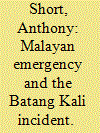

|
|
|
|
|
| Publication |
2010.
|
| Summary/Abstract |
The article describes the Batang Kali incident in which a number of Chinese workers were shot dead by the British army in circumstances which have never been satisfactorily explained. The author, who published a history of the Malayan Emergency some years ago, sets the incident in the wider context of British policy in the somewhat confused early months of the Emergency. He then chronicles the subsequent attempts to re-examine events. He then examines various suggestions that British policy was in general one of deliberate counterterror and concludes that the available evidence does not really substantiate this charge.
|
|
|
|
|
|
|
|
|
|
|
|
|
|
|
|
| 15 |
ID:
080265


|
|
|
|
|
| Publication |
London, Routledge, 2008.
|
| Description |
xviii, 238p.Hbk
|
| Series |
Studies in intelligence series
|
| Standard Number |
9780415372800
|
|
|
|
|
|
|
|
|
|
|
|
Copies: C:1/I:0,R:0,Q:0
Circulation
| Accession# | Call# | Current Location | Status | Policy | Location |
| 053025 | 940.4864109174927/MOH 053025 | Main | On Shelf | General | |
|
|
|
|
| 16 |
ID:
117155
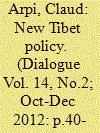

|
|
|
| 17 |
ID:
188594
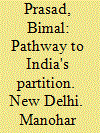

|
|
|
|
|
| Publication |
New Delhi, Manohar Publishers and Distributors, 1999.
|
| Description |
319p.hbk
|
| Contents |
Vol. I: The Foundations of Muslim Nationalism.
|
| Standard Number |
8173042489
|
|
|
|
|
|
|
|
|
|
|
|
Copies: C:1/I:0,R:0,Q:0
Circulation
| Accession# | Call# | Current Location | Status | Policy | Location |
| 060275 | 954.04/PRA 060275 | Main | On Shelf | General | |
|
|
|
|
| 18 |
ID:
101710


|
|
|
|
|
| Publication |
2010.
|
| Summary/Abstract |
he conservative ideologists have come to the ultimate conclusion that it does not make sense to rely on the European Union as a protector of Britain's national interests in the international scene and that its own independent capabilities should be built up. In the new European context London's approach might become a model to follow for other major EU states.
|
|
|
|
|
|
|
|
|
|
|
|
|
|
|
|
| 19 |
ID:
071311


|
|
|
|
|
| Publication |
2006.
|
| Summary/Abstract |
This paper looks at the development of British government policy towards Iraq in the run up to and during the war of 2003 with particular focus on the territorial borders of Iraq. The paper argues that, in contrast to what we might expect from the perspective of classical geopolitics, the issue of the location of Iraq's borders was largely taken for granted by the UK government. The territorial integrity of Iraq was repeatedly asserted by British ministers, including the Prime Minister, Tony Blair. However, the paper suggests that this disguises an important and potentially significant challenge to the role that territorial borders played in the Iraq crisis and conflict, and this is connected to wider changes in thinking about territorial borders in international politics that have characterised the Labour government's foreign policy thinking. This challenge sees territorial borders' significance more in terms of the nature of the regime they help to delimit than the geopolitical significance of their location. Also, the respect to be given to those borders is significantly influenced by the willingness and ability of that regime to contribute to dominant political and politico-economic agendas, including democracy, human rights, counter-terrorism and economic liberalisation. It is argued that policy towards Iraq demonstrates effectively this distinctive approach developed by the UK government, and points to weaknesses as well as strengths of adopting such a position on one of the most important institutions of the international system.
|
|
|
|
|
|
|
|
|
|
|
|
|
|
|
|
| 20 |
ID:
127721


|
|
|
|
|
| Publication |
2014.
|
| Summary/Abstract |
This article is based on recently declassified Sigint reports on Eastern Europe produced by GCHQ and covering the years 1945 to 1950. This material allows historians to fill in an important gap in the current historiography, namely the virtual absence of Sigint in the discussion of post-war British policy. The significance of this material is not so much the actual content - much of it does not come as a great surprise to historians - but rather the extent to which it enabled the British government to almost immediately draw a precise and detailed picture of events behind the iron curtain and how this affected not only British foreign policy, but particularly domestic policy, in the field of counter-subversion.
|
|
|
|
|
|
|
|
|
|
|
|
|
|
|
|
|
|
|
|
|